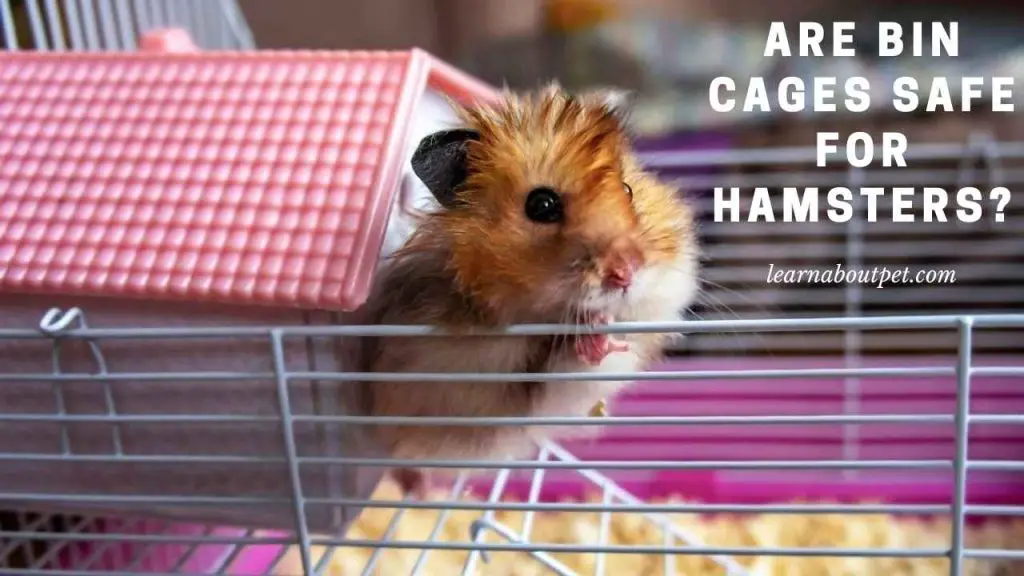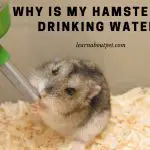Many things need to be precise before you take care of a hamster. You must understand hamsters’ proper diet and their environments, such as cages and contents. Although there are many cage types for hamsters, the one type of cage that is a heavily debated topic is a bin cage.
Are bin cages safe for hamsters? Bin cages can be safe for hamsters if you use a wire mesh around the bin to prevent the hamster from chewing through the plastic. Ensure the top is solid and escape-proof, and the bin sides have proper ventilation.
We need to know why there are so many conflicting opinions about bin cages for hamsters. Let’s read this article to find out the answer.

What Is A Bin Cage?
Bin cages are cages made out of storage bins. A bin cage for hamster is the most economical caging option for owners who are used to using basic tools for their pets. Many choose to use bin cage ideas because they are relatively cheap, between $15-30 or less.
Are Bin Cages Safe for Hamsters?
There are many questions on bin cages and whether safe for pet hamsters or not. If you provide adequate ventilation and plenty of space, the DIY hamster bin cage has the same function as other cages types.
Are bin cages safe? Yes, as long as you provide adequate ventilation and enough space for each hamster you put in it.
Are Bin Cages Bad For Hamsters?
It’s normal when many pet owners ask, ‘are bin cages bad for hamsters’ because bins are made of solid plastic, unlike other cages, which have lots of holes for air.
Hamster bin cages are safe if you can provide plenty of ventilation according to the hamster’s needs. You can use wire mesh to provide a space at the top of the storage bin hamster cage with unobstructed air.
Are bin cages safe? A bin cage is safe when you can provide air access into the cages, and your hamster can move freely.
Are Hamster Bin Cages Good?
Bin cages hamsters are good if you choose a transparent color. You can see whatever the hamster is doing in the cages. Ensure you provide plenty of ventilation and lots of toys inside. Bin cages for hamsters need to have solid lids to prevent any hamsters from moving out of their enclosure.
Do bin cages work for mice? Hamsters and mice are similar in size. If you can provide a bin cage that fits the size, you can use it for mice or hamsters.
Are bin cages safe? Yes, bin cages are secure when you can provide large air and space.
Can Hamsters Bite Through Bin Cages?
Hamster bin cages have a few drawbacks. One is that hamsters can chew through nearly anything if their teeth are strong. When you make holes that your hamster can reach, holes that are smaller than them can get bigger because they are chewed little by little.
Are bin cages safe? If hamsters are uncomfortable with their small space, or you are not giving them a proper diet, they will try to escape by chewing the plastic.
Are bin cages safe for hamsters? You can use bin cages for hamsters when you’re ready to give them plenty of space and toys to keep them from getting bored.
Can A Hamster Chew Through A Bin Cage?
Hamsters can try to chew their plastic cages. Make ventilation in the DIY plastic bin hamster cage holes out of reach of the hamster. You can use wire mesh on top of the enclosure to provide more air access if you want bin hamster cages with minimal ventilation at the bottom.
Bin cages for hamsters should be made as comfortable as possible because if you want to use an economical hutch you must still meet the needs.
Are bin cages safe? While there is a possibility that your hamster will run away after chewing the plastics, bin cages are still safe for your pet hamsters.

What Can I Use As A Bin Cage?
When looking for a hamster bin cage for sale, you will find big 20-50 gallon plastic containers for one or more hamsters. Learn how to properly ventilate a bin cage Syrian hamster because hamsters can chew everything.
If you’re confused about the air circulation in a hamster cage storage bin, look for what kind of mesh for a bin cage. Steel mesh is an excellent choice for the top of the cage. Try to keep every corner tightly closed to reduce the chances of the hamster escaping.
Is There A Bad Side To Bin Cages?
There is no bad side to the DIY bin cage for hamster. The hamster bin can be escape-proof if you can secure the mesh well. What hamster owners think about bin cages is that they’re popular, but are bin cages safe? Bin cages require aluminum tape on each edge to ensure the hamster doesn’t escape.
Are bin cages safe? Try to provide bin cages for your hamster and see how secure it is for your pet.
How Do I Make A Safe Bin Cage?
Hamster cages in pet stores can be expensive for beginner owners. Luckily, you can make a plastic storage bin hamster cage with a few tools and supplies. Ensure you have the proper hamster bin cage size for your pet. The table below will explain how to build a bin cage for hamster.
| How to make | Explanation |
| Measuring and cutting the lid | Purchase large bin cages for hamsters at least 76 x 38 x 38 cm. |
| Attaching hardware mesh | Cut the hardware mesh to the bin hamster cage size. |
| Setting up the cage | Clean hamster bin cage ventilation and inside of the bin with diluted bleach solution. |
| Place layer bedding and cage inventories | Use bedding to absorb hamster urine and get a hamster wheel for pet’s exercise. |
How To Connect Bin Cages?
When you want to install a hamster bin cage with tubes, you need to connect the bin cage for Syrian hamsters to the tubes. Cut a circle in the enclosure smaller than the tube and push the tube through as you can see it. The hamster bin cage will be more varied if there is a tube.
Is A Plastic Bin Dangerous?
The plastic bin hamster cage is the choice of many pet owners as their first pet place. The abundance of plastic bin hamster cage ideas raises the question of whether plastic bins are safe. Try not to provide a hole that can be bitten by your hamster.
Can you use a plastic bin for a hamster cage? Try looking for references about safe plastic bins, such as the Ikea Samla bin cage, by adjusting the bin cage size for hamsters.
Do Bin Cages Need Lids?
Several hamster owners recommend a DIY hamster bin cage without mesh, even though there is a risk that their hamster will escape. Hamster bin cage ventilation is vital for the safety of your pet.
Do bin cages need lids? Yes, bin cages need a lid to keep hamsters out of their enclosure.
Can Hamsters Chew Out Of Bin Cages?
Hamsters can eat whatever they want. The DIY bin hamster cage can be dangerous if the holes in the enclosure are bitten bit by bit. It can be a choking hazard if the plastic size is large enough.
Are bin cages safe for gerbils? Yes, it might be good, if you can make it adequately and securely.
What Is The Best Hamster Cage To Buy?
There are still many choices of cages besides the hamster bin cage if you are still unsure about the safety of the plastic bin. Hamster cage bins require adequate lid and ventilation for your pet’s needs.
There are several names for the best hamster cages like Savic Metro hamster cage, Favola hamster cage, Savic Micky hamster and mouse cages, Kaytee Multi-Level Exotics cage, etc.

Final Verdict – Are Bin Cages Safe
Bin cages can be used for hamsters if you can provide adequate lids and ventilation. Ensure you provide bedding and some toys for hamster activities while in the enclosure. Don’t make a big hole in the sides of the bin cages. It will prevent the hamsters from biting into the holes and don’t let the hamster escape out of the cage.
As a pet lover, make sure to learn about pet more and give your pet hamster a good and comfortable life!

Welcome to Learn About Pet. My name is Rajkumar Ravichandran and I love all pets, travel, and amazing food. I write about my passion and personal experience caring for multiple pets in this blog! ❤️
Post Disclaimer
DISCLAIMER: THIS BLOG OR WEBSITE, "Learn About Pet", DOES NOT PROVIDE YOU WITH MEDICAL ADVICE AND IS NOT A SUBSTITUTE FOR MEDICAL ADVICE. ALWAYS GET IN TOUCH WITH YOUR PERSONAL VETERINARIAN AND USE INFORMATION HERE AS GENERAL ADVICE.
The information, including but not limited to, text, graphics, images and other material contained on this website are for informational purposes only. No material on this site is intended to be a substitute for professional veterinary advice, food recommendation, diagnosis, or treatment. Always seek the advice of your veterinarian or other qualified health care provider with any questions you may have regarding a medical condition or for pet food related questions.







